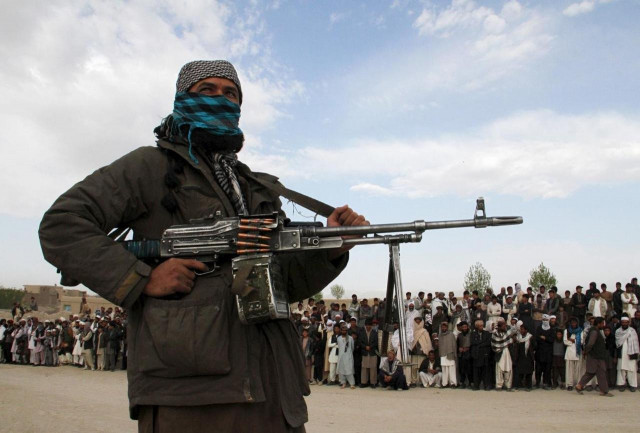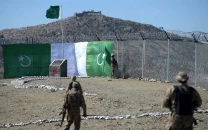‘Azm-e-Istehkam’: Pakistan plans new diplomatic push against TTP sanctuaries in Afghanistan
Sources say new campaign has two prongs: one addresses internal security and the other focuses on external threats

Pakistan will mount fresh diplomatic efforts to persuade the interim Afghan Taliban government to dismantle terrorist sanctuaries as part of the new plan approved by the country's civil and military leadership, people familiar with development revealed here on Sunday.
The Central Apex Committee of the National Action Plan (NAP) on Saturday gave a go ahead to launch a new military campaign named Operation Azm-e-Istehkam to eradicate terrorism and extremism.
Sources said the new campaign has two prongs: one addresses the internal security situation, while the other focuses on external threats emanating from Afghanistan.
While kinetic operation and intelligence based campaign against terrorist outfits will be intensified under the renewed anti-terror drive, a fresh diplomatic effort will be launched to neutralise the threat coming from the neighbouring country.
Since the return of Taliban in Kabul in August 2021, the number of terrorist attacks has only gone up, much to the dismay of Islamabad.
The first five months of this year saw 83 per cent increase in terrorist attacks, forcing authorities to launch a fresh campaign against militant groups.
Sources said under the new plan, Pakistan will once again approach the Kabul regime, giving it a chance to come good on its promises in eradicating terrorist sanctuaries.
Sources added that Pakistan will also seek China's help in persuading the Afghan Taliban to review their strategy regarding the banned Tehreek-e-Taliban Pakistan (TTP).
Also read: Khawaja Asif says PTI ‘siding’ with terrorists after party opposes 'Azm-e-Istehkam' op
China is apparently enjoying more leverage over the Taliban than Pakistan, which has historic ties with the group. However, since returning to power, relations between Pakistan and the Taliban government only got from bad to worse.
Sources said China has stakes in the security of Pakistan as increased terrorist attacks have impeded its investment.
A key Chinese minister on a recent visit to Pakistan publically warned that attacks on Chinese nationals in Pakistan shook the confidence of Chinese investors.
The minister linked the future investment of China with improvement in the security and business environment in Pakistan.
A day after his frank statement, the country’s civil and military leadership approved the launch of new military campaign against terrorist groups.
The increased Chinese concerns over the security situation were of the main factors which compelled Pakistan to initiate fresh anti-terror drive.
Meanwhile, Pakistan believes that the main source of surge in terrorist attacks stems from the TTP hideouts across the border.
On Friday, Pakistan told the UN Security Council that the elimination of terrorism within and from Afghanistan remains the highest priority for the international community, Afghanistan's neighbours, and Afghanistan itself.
Despite progress made by the Afghan Interim Government (AIG) in combating Daesh (ISKP), several other terrorist groups, including Al-Qaeda, TTP, ETIM, and IMU, continue to operate in Afghanistan, according to Ambassador Munir Akram, Pakistan's permanent representative to the UN
Pakistan urged the AIG to take effective and sustained action against these groups in compliance with several Security Council resolutions.
During the UN Security Council meeting on Afghanistan, Ambassador Akram highlighted the dangers of allowing impunity for terrorist groups in Afghanistan. He emphasised that goals such as investment, social and economic development, and infrastructure projects cannot be achieved as long as these groups operate freely within and from Afghanistan.
Ambassador Akram described the Tehreek-e-Taliban Pakistan as the most direct and serious threat to Pakistan. He detailed the TTP's terrorist activities, which have resulted in hundreds of civilian and military casualties.
He said the TTP has intensified its attacks, after acquiring sophisticated weapons. Despite Pakistan's repeated calls for the AIG to take decisive action against the TTP, including halting cross-border attacks, disarming fighters, and handing over terrorists, no significant action has been taken, he said.
He said that the TTP safe havens near Pakistan's borders persist, and recent cross-border attacks have included one that killed several Chinese engineers working on the Dasu hydropower project.
Ambassador Akram urged the UN Security Council to call on the AIG to sever its links with the TTP and its associates, prevent cross-border attacks against Pakistan, disarm TTP terrorists, and capture and hand over TTP leaders to Pakistan.
He said that Pakistan continues to advocate for sustained engagement with the Afghan interim authorities to help normalise the situation in Afghanistan. He said that the AIG's decision to participate in the Doha meeting at the end of this month represents a critical opportunity for constructive dialogue on all key issues related to Afghanistan.
Ambassador Akram stressed the importance of having clear objectives for both the international community and the AIG. He said that as highlighted by the UN Special Coordinator on Afghanistan, addressing the major issues for normalisation requires a realistic roadmap, outlining reciprocal steps by the AIG and the international community towards Afghanistan's normalisation and integration into the global community.
He reminded the international community of its obligation to assist the 23 million Afghans in urgent need of humanitarian aid. Unfortunately, the Afghanistan Humanitarian Needs and Response Plan has only received 16.2% of the necessary $3.06 billion for the targeted 17.3 million Afghans.
Full funding from all possible sources is essential to meet these critical needs, he maintained.
Ambassador Munir Akram also termed the revival of the Afghan economy and finding pathways for sustained development as being equally important, a task which, he said, requires the restoration of the Afghan banking system, commercial activities, and private sector investment. Additionally, creating conditions for the release of Afghanistan’s frozen assets and their transfer to its Central Bank is crucial, he stated.
Ambassador Akram said that planned infrastructure and regional connectivity projects must be initiated and expressed Pakistan’s commitment to expanding trade and economic relations with Afghanistan. He said that in March, Pakistan and the AIG signed a 9-point agreement on trade and transit issues to promote economic relations.
The Pakistan UN Ambassador asked the AIG to take steps to meet its obligations in line with international law and established norms. He said that global concern remains over the restrictions imposed on women and girls in Afghanistan, which do not align with international law or Islamic tenets.
Concluding the statement, Ambassador Akram said that Pakistan enjoys close bonds of ethnicity, history, faith, language, and culture with Afghanistan. Promoting peace, stability, and development in Afghanistan is a national compulsion for Pakistan.
“We will continue to work at all levels—bilateral, regional, international, and with the UN—to achieve these objectives,” he declared.



















COMMENTS
Comments are moderated and generally will be posted if they are on-topic and not abusive.
For more information, please see our Comments FAQ